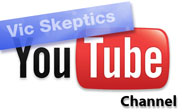(Creationism articles)
The Great Debate: Creation v Evolution
One of the many amazing stories in the Bible is the story of The Great Flood. Before The Great Flood Noah was commanded by his God to build an ark (a large boat) and to collect a pair of all the animals on Earth. The Great Flood wiped out all the other animals, including humans, and those on Noah’s Ark repopulated the Earth after the flood subsided.
Given our present knowledge of evolution, genetics, geology, physics and archeology, few people, even practising Christians, believe the story to be literally true. However there are some people who insist that all the Bible stories are literally true. As well as the story of Noah’s Ark, they also believe that:
- The Earth and all living things on it were created in six 24-hour days.
- This occurred about 10,000 years ago.
- All present day animals are descended from those on Noah’s Ark.
- The theory of evolution is incorrect because it is not consistent with the Bible stories.
These are the fundamental beliefs of Creationism. But why are the religious beliefs of Creationists of concern to scientists? Does it matter if people’s religious beliefs are in disagreement with scientific knowledge? Scientists and science educators are concerned about Creationism because:
- The Creationists dispute the theory of evolution. Evolution is the foundation of biology and has great scientific credibility, so it is important to defend it from the misleading information presented by Creationists.
- Creationists claim to have scientific evidence for their beliefs, but their science is misleading and doesn’t stand up to scrutiny. The scientific community is concerned that non-scientists will be confused by this misinformation.
- Creationists want Creationism to be taught in science classes as an alternative theory to evolution. This is not acceptable to science educators, as it is a religious belief, not a scientific theory.
Darwin and the Theory of Evolution
Charles Darwin proposed the theory of evolution in 1859. He presented his theory after a five-year journey around the world as the naturalist on a British naval ship sent out to make charts for the navy. He had many adventures during the journey, but he also collected many animal, bird and plant specimens and recorded many observations about the living things in many different places. He was impressed by the variety of species and how they had adapted to different environments. To explain the varieties and adaptations, he proposed that species evolved to suit their environments by a process of gradual change over millions of years. He produced the theory of evolution to make sense of what he had observed.
Since Darwin’s time a great deal of other evidence has been gathered which supports the theory. The evidence from palaeontology, physiology, biochemistry, genetics and other areas of science fits together so well that the theory is as certain as any scientific theory can be. Biologists do not doubt that life on Earth exists in its present forms because of evolution.
How Science Increases Our Understanding of the World
The method used by Darwin to arrive at his theory is typical of the scientific method. Data is gathered, patterns observed, questions asked, explanations proposed and the theory tested against further evidence. Sometimes the evidence doesn’t fit the theory and the theory will be modified; but a good theory must explain all the facts. If it doesn’t, it may have to be abandoned and replaced by another theory.
Why Creationism is not Science
But this is not how Creationists work. Creationists have one overriding belief, which for them is indisputable. They believe that the Bible is the given word of God, and everything in the Bible is literally true. So the Creationists try to show that their belief is correct by gathering evidence to support it. Unfortunately, they tend to gather the evidence that suits them, and ignore evidence that is inconvenient. They interpret the evidence so that it fits their interpretation of the Bible. This is not in the spirit of science.
Creationists make many claims about the theory of evolution, attempting to prove it is wrong. The claims can sound convincing to non-scientists, but are misleading and based on faulty science. Scientists have convincingly rebutted these claims.
The Australian Skeptics hope that this introduction to the evolution/creation debate stimulates you to find out more about it. What are the claims made by Creationists and how do scientists answer those claims? Here are some resources to help you:
References
Books on evolution will be found in libraries at Dewey number 575.
Web Sites
For more Victorian Skeptics articles on Creationism: Creationism
http://evolution.berkeley.edu/ [A site about evolution for students & teachers]
http://www.amonline.net.au/exhibitions/dinosaur2.htm#1 [The Australian Museum answers questions on evolution.]
http://www.talkorigins.org/ [Articles & discussion on the evolution/creation debate]
http://skepdic.com/creation.html [An article on Creationism with references]
http://home.austarnet.com.au/stear/ [An Australian site on evolution & creation]
http://www.aboutdarwin.com/ [About Darwin’s life, his remarkable voyage and his theory]
Important Words
Class work: Make sure you know the meaning of these words:
Evolution; Creationism; Adaptations; Theory; Observations; Species; Palaeontology; Physiology; Biochemistry; Genetics.
PTH










